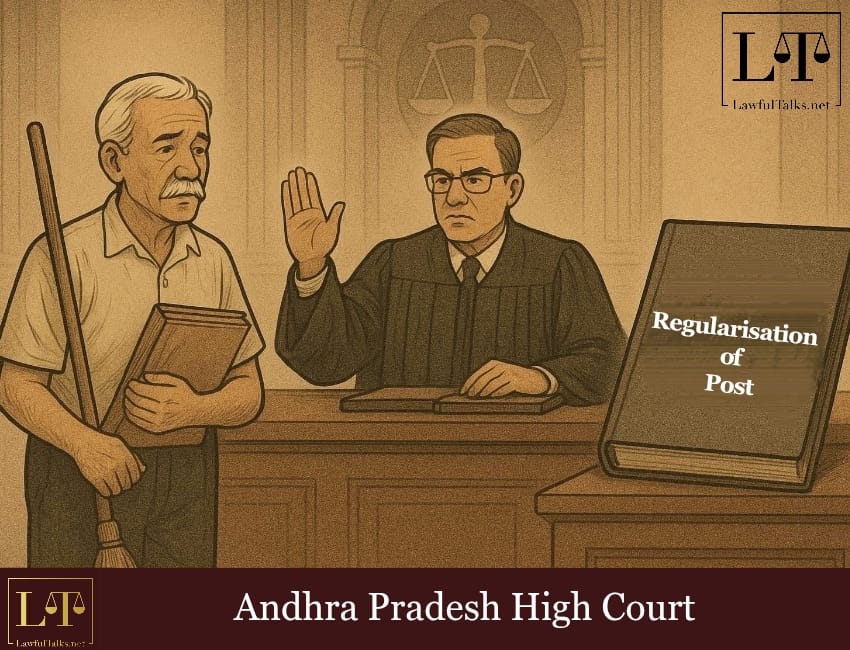Allahabad HC Sets Aside Afzal Ansari's Conviction, Allows Him to Continue as MP

This is a case of a ‘games peon’, who had rendered 30 years of uninterrupted service at the state run Guntur Medical College and had sought regularisation of his position but was turned down by the State, on technical grounds that his position was non-existent and his post was not a formally sanctioned one.

The Andhra Pradesh High Court, however upheld the regularisation of the peon E. Subba Rao observing that technical issues must be by-passed and government institutions must not ignore the legitimate expectations of employees who have rendered decades of uninterrupted service.
Justice B. Krishna Mohan and Justice A. Hari Haranadha Sarma presided over the matter.
Facts:
The background of the case is that the Respondent No.1 had approached the Andhra Pradesh Administrative Tribunal, (APAT) under Section 19 of the A.P. Administrative Tribunals Act, 1985, seeking regularisation of his services under G.O.Ms.No.212, dated 22.04.1994. He contended that he had worked as a Games Peon since 1976 and had completed over three decades of uninterrupted service. The Tribunal accepted his plea and directed the government to consider regularising him, either by creating a post of Games Peon or adjusting him against any Class-IV vacancy in accordance with the G.O.
The State government, through its Principal Secretary (Medical & Health) and the Principal of Guntur Medical College, challenged the APAT’s direction on several grounds. It was argued that the Respondent No. 1 was appointed not by the government but by the college’s Sports Association, and that his salary was paid through the Students’ Association Fund, not from the state exchequer. They also pointed out that the post of 'Games Peon' did not officially exist in the sanctioned staffing structure of the college, and that regularisation was not possible in the absence of a sanctioned post.
However, the High Court rejected these contentions, observing that the cheques issued to the Respondent No. 1 were drawn on the State Bank of India Treasury using government funds and signed by the Principal in his capacity as a government official. The Court held that if the salary was not paid from government funds, there would have been no need for government cheques, thereby satisfying one of the essential conditions under G.O.Ms.No.212.
The Court further held that the Respondent No. 1’s duties such as marking play fields, handling sports equipment, and assisting in physical education activities were akin to the roles performed by other Class-IV staff, including office subordinates, sweepers, and watchmen. It emphasized that the absence of a formal post titled ‘Games Peon’ was not sufficient grounds to deny regularisation, especially when the work done was equivalent to sanctioned roles
“The objection of the writ petitioners is that the 1st respondent-Subba Rao, rendered services as ‘Games Peon’ and such post is not there. The meaning of the word ‘peon’, as per Oxford Dictionary for Indian subcontinent includes a low ranking soldier or worker, therefore, it can be understood that, ‘peon’ is an office messenger, attendant and usually refers to support the staff in an office/association, also known as ‘office assistant’. Their duties include maintaining cleanliness, providing general support to office staff.” the court stated.
The High Court noted that the designation “peon” generally refers to support staff who assist in basic office and field-level duties, and that nomenclature cannot override the substance and continuity of the work performed.
“The Designation ‘peon’ in Government department or office is a category of post having role in day to day functioning of the office. As rightly observed by the learned APAT, nomenclature of the designation does not play major importance but duties of the 1st respondent herein-E.Subba Rao, require consideration and continuity of his service plays important role.” the bench stated.
Referring to the Supreme Court’s ruling in State of Karnataka v. Uma Devi, the Court clarified that the decision did not preclude the application of G.O.Ms.No.212, which itself was a special regularisation scheme.
The Court further distinguished the case from State of Gujarat v. R.J. Pathan, cited by the Petitioner, and clarified that it involved temporary appointments made for a specific project and was therefore not relevant to the Respondent No. 1’s circumstances.
Ultimately, the Court found no legal infirmity in the APAT’s conclusion and held that the Respondent No. 1 fulfilled the eligibility criteria for regularisation. It affirmed that government institutions must not ignore the legitimate expectations of employees who have rendered decades of uninterrupted service.
Accordingly, the writ petition was dismissed, and the directions issued by the Tribunal for regularisation were upheld.
Case Details: The Government Of Andhra Pradesh, and Others vs. E Subba Rao and Others, Writ Petition No. 25887/2010Advocate for the Petitioner: The Advocate General (AP), Addl Advocate GeneralAdvocate for the Respondent: K Ramamohan, Gp For Services IV, Gp For Services I
Leave a Comment

Anushka Bandekar
Advocate
Latest Posts
Categories
- International News 19 Posts
- Supreme Court 326 Posts
- High Courts 339 Posts







































































































































































































































































































































































































































































































































































































































































































